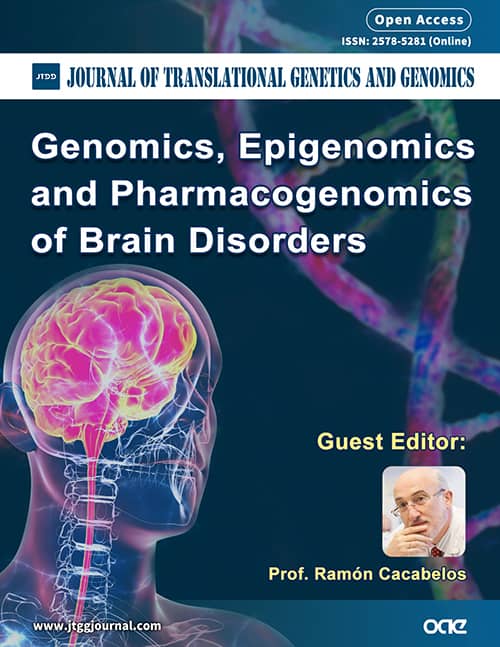
Topic: Genomics, Epigenomics and Pharmacogenomics of Brain Disorders
A Special Issue of Journal of Translational Genetics and Genomics
ISSN 2578-5281 (Online)
Submission deadline: 20 Jul 2023
Guest Editor(s)
Special Issue Introduction
About 80% of brain disorders have a genomic basis. In the pathogenesis of most dysfunctional processes that give rise to a neuropsychiatric disease converges multiple genomic defects, epigenomic aberrations (DNA methylation, histone/chromatin remodeling, miRNA dysregulation), and various environmental factors.
This principle is applicable to infant-juvenile brain disorders, adult pathologies, and the neurodegenerative processes of senescence. In the case of neurodegenerative disorders (Alzheimer's disease, Parkinson's disease, etc.), the symptoms appear decades after the process of neuronal destruction has begun and, progressively and irreversibly, consolidates a cascade of events that lead to premature neuronal death.
To pre-symptomatically identify the risk of suffering from these diseases and to be able to act preventively, in order to stop the process or slow it down, reliable biomarkers are necessary. In recent years, the emergence of new DNA technologies (NGS, GWAS) and excellent methods of study of the epigenome has allowed a modern approach to predictive biomarkers of high sensitivity to address early a presymptomatic diagnosis and be able to intervene prophylactically.
Consequently, the areas of pharmacogenetics and pharmacoepigenetics have also experienced important advances to personalize pharmacological treatments based on the pharmacogenomic profile of each patient and the epigenetic mechanisms responsible for the regulation of gene expression. All the genes that make up the pharmacogenetic machinery are regulated by sensitive epigenetic mechanisms that regulate their repression (silencing) or their expression. The pharmacogenetic machinery is composed of (i) pathogenic genes associated with the pathogenesis of each disease; (ii) mechanistic genes related to the mechanism of action of drugs; (iii) metabolic genes that encode the enzymes of phase-I and phase-II reactions in liver and other tissues; (iv) transporter genes that encode the transporter proteins responsible for accessibility or rejection to target tissues; and (v) pleiotropic genes involved in a multitude of metabolomic processes.
This Special Issue of the Journal of Translation Genetics and Genomics on Genomics, Epigenomics and Pharmacogenomics of Brain Disorders is an invitation to novice researchers and experts in the fields of genomics, epigenomics and pharmacogenomics to share their innovative findings that will allow a qualitative leap in the understanding of the pathogenesis of diseases of the central nervous system, their early diagnosis, and their personalized treatment. The field is extensive, from neurodevelopmental disorders (autism spectrum disorders, attention-deficit hyperactivity disorder, intellectual disability) to the most common psychiatric disorders (depression, schizophrenia, bipolar disorder, obsessive-compulsive disorder, anxiety, personality disorders), various neurological disorders (epilepsy, movement disorders, neurodegenerative disorders) and cerebrovascular disorders (stroke, migraine).
It is a pleasure and an honor for me to invite all interested colleagues to participate in this interesting initiative which will undoubtedly open up new horizons in the field of diseases of the nervous system.
Ramón Cacabelos, M.D., Ph.D., D.M.Sci.
Professor & Chairman of Genomic Medicine
To pre-symptomatically identify the risk of suffering from these diseases and to be able to act preventively, in order to stop the process or slow it down, reliable biomarkers are necessary. In recent years, the emergence of new DNA technologies (NGS, GWAS) and excellent methods of study of the epigenome has allowed a modern approach to predictive biomarkers of high sensitivity to address early a presymptomatic diagnosis and be able to intervene prophylactically.
Consequently, the areas of pharmacogenetics and pharmacoepigenetics have also experienced important advances to personalize pharmacological treatments based on the pharmacogenomic profile of each patient and the epigenetic mechanisms responsible for the regulation of gene expression. All the genes that make up the pharmacogenetic machinery are regulated by sensitive epigenetic mechanisms that regulate their repression (silencing) or their expression. The pharmacogenetic machinery is composed of (i) pathogenic genes associated with the pathogenesis of each disease; (ii) mechanistic genes related to the mechanism of action of drugs; (iii) metabolic genes that encode the enzymes of phase-I and phase-II reactions in liver and other tissues; (iv) transporter genes that encode the transporter proteins responsible for accessibility or rejection to target tissues; and (v) pleiotropic genes involved in a multitude of metabolomic processes.
This Special Issue of the Journal of Translation Genetics and Genomics on Genomics, Epigenomics and Pharmacogenomics of Brain Disorders is an invitation to novice researchers and experts in the fields of genomics, epigenomics and pharmacogenomics to share their innovative findings that will allow a qualitative leap in the understanding of the pathogenesis of diseases of the central nervous system, their early diagnosis, and their personalized treatment. The field is extensive, from neurodevelopmental disorders (autism spectrum disorders, attention-deficit hyperactivity disorder, intellectual disability) to the most common psychiatric disorders (depression, schizophrenia, bipolar disorder, obsessive-compulsive disorder, anxiety, personality disorders), various neurological disorders (epilepsy, movement disorders, neurodegenerative disorders) and cerebrovascular disorders (stroke, migraine).
It is a pleasure and an honor for me to invite all interested colleagues to participate in this interesting initiative which will undoubtedly open up new horizons in the field of diseases of the nervous system.
Ramón Cacabelos, M.D., Ph.D., D.M.Sci.
Professor & Chairman of Genomic Medicine
Keywords
Genomics, epigenomics, pharmacogenomics, brain disorders, neurodevelopmental disorders, psychiatric disorders, neurological disorders, cerebrovascular disorders
Submission Deadline
20 Jul 2023
Submission Information
For Author Instructions, please refer to https://www.oaepublish.com/jtgg/author_instructions
For Online Submission, please login at https://oaemesas.com/login?JournalId=jtgg&SpecialIssueId=jtgg211027
Submission Deadline: 20 Jul 2023
Contacts: Jixiang Zhao, Assistant Editor, jixiang.zhao@jtggjournal.com





